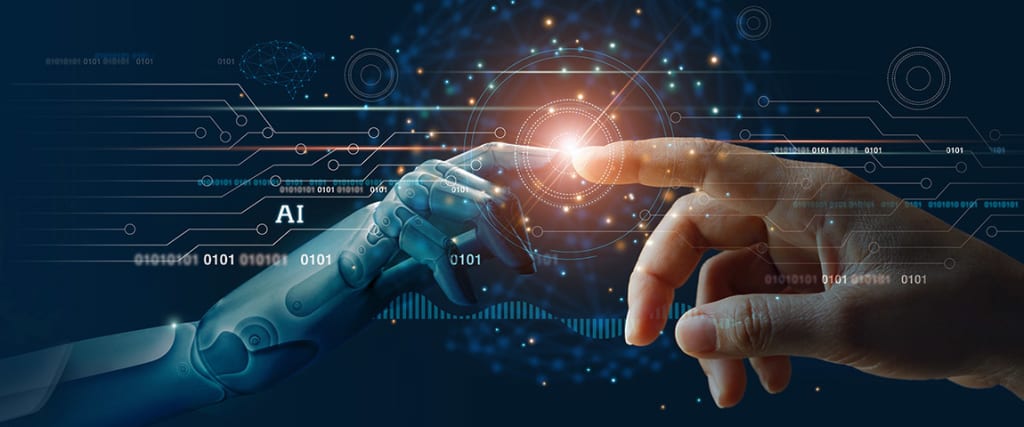
AI, or artificial intelligence, is transforming many industries and has the potential to automate many different types of jobs. This trend is leading to concerns about job displacement, income inequality, and the future of work. In this essay, we will explore the ways in which AI is destroying jobs and the potential consequences of this trend.
One of the most significant impacts of AI on the job market is its ability to automate routine and repetitive tasks. Many jobs involve performing the same task repeatedly, such as data entry, assembly line work, or customer service. These jobs are often dull and repetitive, leading to low job satisfaction and high turnover rates. However, they also provide stable employment for many people. As AI continues to improve, more and more of these jobs are becoming automated, leaving many workers without a source of income.
Another way in which AI is destroying jobs is by replacing human decision-making with automated algorithms. In industries such as finance and healthcare, AI can analyze large amounts of data and make decisions more quickly and accurately than humans. While this can lead to improved efficiency and better outcomes, it can also lead to job loss for people who were previously responsible for making these decisions.
AI is also contributing to the growth of the gig economy, which is characterized by short-term contracts or freelance work instead of permanent jobs. Platforms such as Uber and TaskRabbit use AI algorithms to match workers with jobs, and these platforms are growing rapidly. While the gig economy can provide more flexibility and autonomy for workers, it also lacks the benefits and stability of traditional employment. Many gig economy workers are classified as independent contractors, meaning they do not receive benefits such as healthcare or retirement savings.
The impact of AI on the job market is not limited to low-skilled or routine jobs. Many high-skilled jobs, such as doctors and lawyers, are also at risk of being automated. For example, AI-powered chatbots can provide basic medical advice to patients, potentially replacing the need for doctors in certain situations. Similarly, AI algorithms can analyze legal documents and provide legal advice, potentially replacing the need for human lawyers.
The consequences of AI destroying jobs are numerous and complex. One of the most significant is the displacement of workers who are no longer needed in automated industries. While some workers may be able to retrain for new jobs, many others may struggle to find employment in a rapidly changing job market. This can lead to increased income inequality and social unrest, particularly if the displaced workers do not have access to social safety nets such as unemployment benefits or job retraining programs.
Another consequence of AI destroying jobs is the potential loss of human skills and expertise. As machines take over more tasks, humans may become less skilled at performing them. For example, if self-driving cars become widespread, the need for human drivers may decrease, leading to a loss of driving skills and expertise. Similarly, if AI algorithms become the primary means of decision-making in finance or healthcare, humans may lose the ability to make complex decisions based on intuition or experience.
Finally, AI destroying jobs raises important ethical questions about the role of technology in society. Who should benefit from the increased efficiency and productivity that AI provides? How can we ensure that the benefits of automation are shared fairly, rather than concentrated in the hands of a few? How can we ensure that people are not left behind in a world where AI is increasingly prevalent?
In conclusion, AI is destroying jobs by automating routine and repetitive tasks, replacing human decision-making with automated algorithms, and contributing to the growth of the gig economy. The consequences of AI destroying jobs are numerous and complex, including the displacement of workers, the potential loss of human skills and expertise, and important ethical questions about the role of technology in society.
Disadvantages of AI :
Job displacement: One of the most significant disadvantages of AI is its potential to automate many types of jobs, leading to job displacement and unemployment. AI can automate routine and repetitive tasks, such as data entry, assembly line work, or customer service, leaving many workers without a source of income. This trend can lead to increased income inequality and social unrest, particularly if the displaced workers do not have access to social safety nets such as unemployment benefits or job retraining programs.
Bias: Another disadvantage of AI is the potential for bias in decision-making. AI algorithms are only as unbiased as the data they are trained on. If the data used to train an AI system is biased, the system will produce biased results. This can lead to discrimination in areas such as employment, lending, and criminal justice.
Lack of empathy: AI lacks the ability to feel empathy, which can be a disadvantage in areas such as healthcare and education. While AI can analyze large amounts of data and provide recommendations, it cannot provide the same level of emotional support as a human caregiver or teacher.
Security risks: AI systems can be vulnerable to cyberattacks and other security risks. If an AI system is hacked, it can be used for malicious purposes, such as stealing sensitive data or launching a cyberattack on another system.
Dependence on technology: As AI becomes more prevalent, people may become increasingly dependent on technology to make decisions and perform tasks. This dependence can lead to a loss of critical thinking skills and a decreased ability to make decisions based on intuition or experience.
Privacy concerns: AI systems can collect large amounts of data about people's behavior and preferences, which can raise privacy concerns. If this data falls into the wrong hands, it can be used for malicious purposes, such as identity theft or targeted advertising.
Unemployment: AI may lead to high unemployment rates in the future. With more jobs being automated, there may not be enough jobs for everyone, leading to a rise in poverty and social unrest.
In conclusion, while AI offers many potential benefits, it also comes with several disadvantages, including job displacement, bias, lack of empathy, security risks, dependence on technology, privacy concerns, and potential unemployment. As AI continues to advance, it is important to address these challenges and work towards a future where the benefits of AI are maximized while minimizing the disadvantages.
Thanks for reading by story
here is previous one





Comments
There are no comments for this story
Be the first to respond and start the conversation.